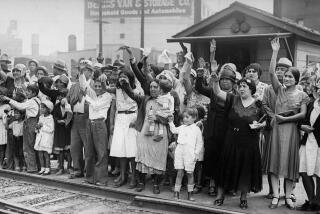Ortega Defends Exile of Church Leaders
- Share via
MANAGUA, Nicaragua — President Daniel Ortega said Saturday that two newly exiled leaders of the Roman Catholic Church in Nicaragua were banished for giving political support to U.S.-backed insurgents and not for religious reasons.
Ortega told workers in the province of Chontales--the home of exiled Bishop Pablo Antonio Vega--that priests will continue to be allowed to perform their pastoral duties in Nicaragua.
“Freedom of religion exists in Nicaragua and is going to continue,” the president said. “But freedom of religion does not mean that one can conspire against the (Sandinista) revolution with the people of the counterrevolution, with (President)Reagan’s people, with people of the CIA.” He continued:
‘Campaign Will Be Launched’
“We know Vega is going to say we were persecuting the church. We know Reagan is going to say we are persecuting the church. We are aware of the campaign that is going to be launched against us. But we are also aware of the crisis which is coming in Nicaragua and Central America if Reagan does not change his attitude.”
Vega, vice president of the Nicaraguan Bishops Conference, was taken to the Honduran frontier and expelled Friday, two days after he spoke at a press conference in defense of “a people’s right to insurrection.” Vega has been a constant, harsh critic of the Marxist-led Sandinista government.
On June 28, the government refused to allow Father Bismarck Carballo, the Church’s main spokesman in Nicaragua, to re-enter this country after a trip to Europe.
Denounced by Pope
Pope John Paul II, traveling in Colombia, condemned the expulsion of Vega in a strong statement Saturday, saying that it “evokes the dark ages.” There was no indication that Ortega was aware of the Pope’s statement when he spoke to the workers in Chontales.
The actions taken against the two church leaders and other moves by the government against its opposition followed a vote in the U.S. House of Representatives to approve $100 million in military and other aid to the contras, U.S.-supported guerrillas battling the regime.
Ortega and other authorities called the June 25 vote a declaration of war and announced that the government will not tolerate internal support for the contras or activities favoring U.S. support for them.
‘Will Not Tolerate Behavior’
On June 26, the nation’s only opposition daily newspaper, La Prensa, was closed.
On Saturday, Ortega said: “There have been some cases of priests--be they bishops or not--who are supporting Reagan’s policy, and we will not tolerate that kind of political behavior which is against the laws of this country.
“The government has had much patience. It has warned these priests, and they have not listened,” he added.
Ortega said the government will not interfere with the rights of priests to say Mass, give Confirmation and provide other religious services. He said Vega and Carballo must remain in exile as long as fighting with the contras continues in Nicaragua.
Church Response Divided
Cardinal Miguel Obando y Bravo, the archbishop of Managua and primate of Nicaragua, has charged that the government persecutes the church, but there are divisions within the church on that issue. Some pro-government priests supported the expulsion of Vega.
Father Ernesto Cardenal, whom the Vatican suspended from priestly functions because he serves as Culture Minister in the Sandinista Cabinet, called Vega a Judas and said he was “bathed in blood” of victims of the contras war.
The nine members of the Nicaraguan Bishops Conference still in the country, including Obando, met in a special session Saturday in Grenada, about 27 miles south of here. Afterward, they issued a mild declaration that they “encourage everyone to remain firm in their faith” and asked that all pray for the church.
U.S. Embassy Accused
Meanwhile, Carlos Nunez, one of the nine members of the Sandinista National Liberation Front directorate, accused opposition political parties of plotting with the American Embassy to withdraw from the Sandinista-dominated National Assembly in a move to isolate the Sandinista government. He made the accusation in El Nuevo Diario, a pro-government newspaper.
“It would be like forming a triangle: In one point the international offensive, in another, the internal situation which we would call the political arm of the counterrevolution and, finally, the military offensive,” Nunez said.
Opposition leaders denied the allegations but suggested they might have been made as a preliminary step in a government move against them.
“It is absurd. No one is coordinating anything with the U.S. Embassy,” said Enrique Sotelo Borgen, coordinator of the Democratic Conservative Party.
“Who knows what objective they have in launching these charges?” Sotelo said.
More to Read
Sign up for Essential California
The most important California stories and recommendations in your inbox every morning.
You may occasionally receive promotional content from the Los Angeles Times.










